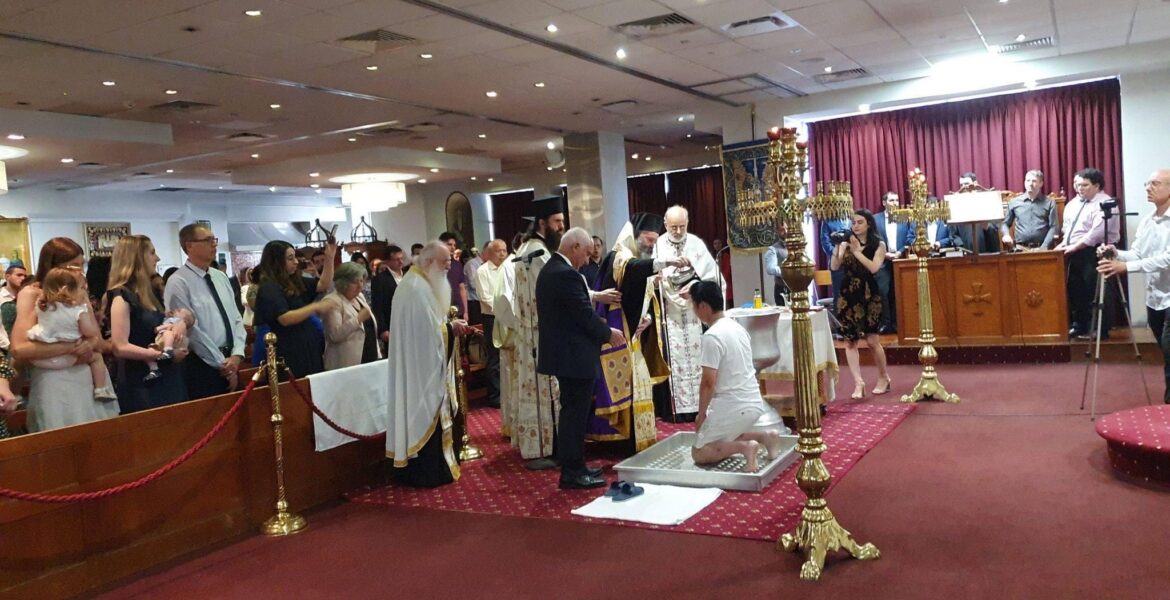Accomplished violinist, published author, eloquent poet and Chinese Greek Orthodox convert. Meet Yang Yu, a.k.a. Ioannis ‘Chrysostomos’ Yiouropoulos.
When you first meet Yang, you’ll realise how much truth there is to the saying; ‘there’s so much than meets the eye’.
Yang or Yianni (he prefers to be called Yianni) is a genuine, passionate human being whose eyes shine with a zest for life. He has made it his life’s mission to find peace and truth.
A firm believer in God, Yianni has spent the last decade ‘finding himself’, and through that delicate and life-altering process, he came across Orthodox Christianity and the Greek Culture.
He has embraced the Greek community and culture with such respect and admiration, that you’d think he was born Greek, even though he is from an Asian background.
GCT’s lifestyle writer Despina Karpathiou sat down with Yianni to talk about his life and ultimately, his decision to convert to Greek Orthodoxy. This is Yianni’s story.
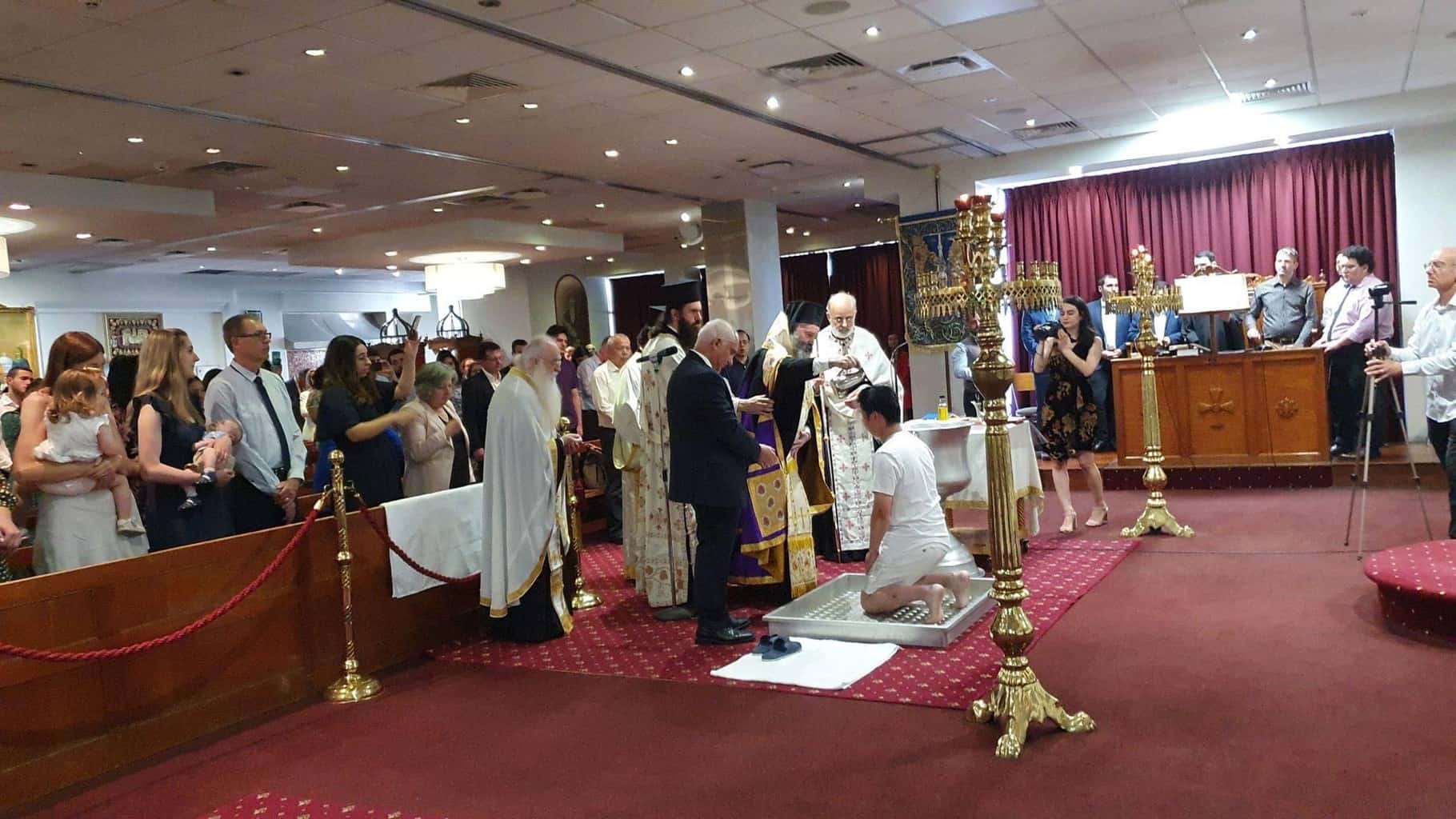
Thank you for agreeing to be interviewed, Yianni! Can you tell our GCT readers a bit about yourself?
Hi everyone! Being a Sydneysider for over 10 years, I’m currently working in the banking and finance industry, as well as doing translating and interpreting works for government departments. I have been writing historical fictions based on my travel to Europe in the past few years, including Greece which I visited briefly in 2017. As a violinist, I have learnt several Greek songs and performed for His Eminence Archbishop Makarios of Australia on several occasions.
What made you interested in joining the Orthodox faith?
Before I came to Australia, I had already read about the history of the Eastern Roman Empire, as well as early Christian history, tradition and Church Fathers at my high school library. In my home country, seeking or practising a religious belief is not encouraged by the authorities and society alike, to say the least.
I joined the Orthodox student fellowship at Sydney University (then known as SUOF) in 2013. To me, it was more of a cultural experience at the beginning.
I enjoyed intellectual conversations at fellowships, went to church for English liturgies and the Holy Week, and spent every Christmas since then visiting my Greek friends.
The Greek customs and culture truly amazes me even to this day, and there are some striking similarities and parallels between this new culture and my native Chinese culture.
I believe that the Eastern Orthodox ecclesiastical tradition is incomparable to most other Christian denominations, given its profound spirituality and mystical elements that encourage us to feel God’s presence in our soul and to cherish that presence through our ongoing works that honour Him and strengthen us.
I see both Christian virtues and pagan values in modern Greek culture, such as ascesis and humility, love of honour (philotimo), wisdom and free will, working with each other to form every individual temple of God that is standing in front of me: my Greek Orthodox friends.
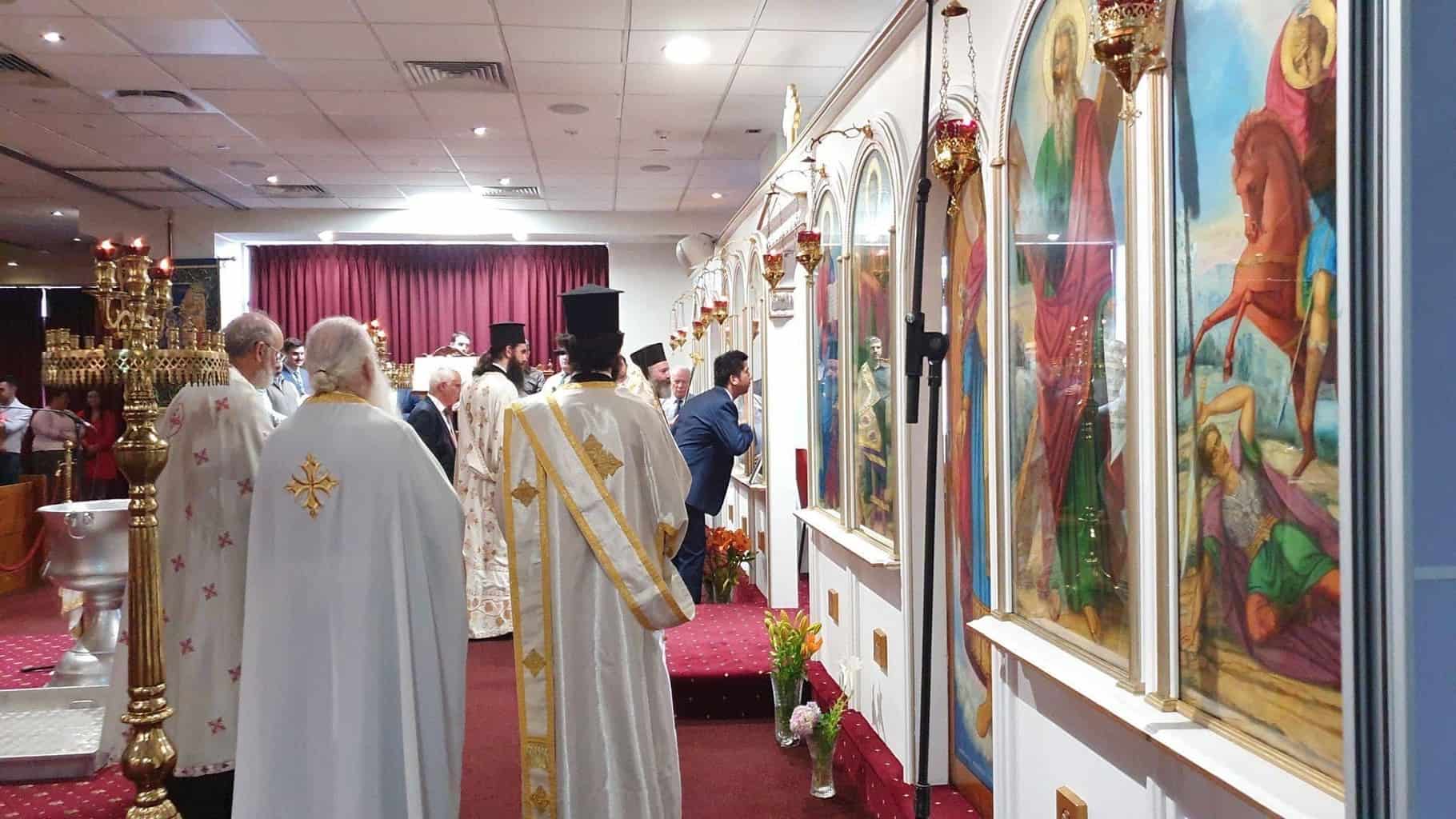
What was something about Greek Orthodoxy that stood out for you?
My orthodox friends said they don’t need to go to pubs to seek entertainment. That impressed me because it demonstrates how spiritual and unworldly they can be.
In a social setting, I felt like I was constantly re-experiencing ancient Greek life:
- The fellowship talks may sometimes appear similar in form to Socrates’ questioning and dismantling of the theoretical foundation of a famous sophist of his time called Gorgias. Yet it was not a philosophical battle of whether the Stoics or the Epicureans prevailed, but a spiritual battle of ourselves constantly overcoming our flaws and passions;
- The Parea: food, drink and chat, seems to bring me back to the Panathenaic Festival, where the proud citizens of ‘the School of Hellas’ conversed freely with their leader, the Strategos Perikles, at the ancient Agora beneath the Acropolis;
- The Orthodox chanting pleased me that we don’t need musical instruments to honour God, and surely Apollo’s lyre and the Delphic oracles are silenced when they no longer have any place of hiding before God’s boundless Grace;
- The occasional student protests on campus, which saw some Orthodox students standing calmly whilst being encircled and ridiculed by radical activists of their age, was a truly remarkable scene. With their courage invisible yet radiant, they do not need the eloquence of Socrates at the hour of his trial, nor the bravery of Leonidas at the narrow path of Thermopylae, but the dignity and humility of St. Polycarp when his side was pierced by a sword.
From my experience in the Greek Orthodox community, I found that Christian and pagan aspects do not necessarily work against each other.
My previous misconceptions that Islam was the entity that preserved classical Western civilisation, and that the Medieval ‘Dark Age’ was an Islamic ‘Golden Age’, were changed.
The West’s deep-rooted ignorance of or prejudice against the achievements of the Eastern Roman Empire and the Orthodox Church is startling.
My friends and I discussed on issues such as the differences in religions and cultures and mentioned some interesting anecdotes such as the Buddha being venerated as a Christian saint called St Josaphat whereas Christ was said to have visited the Himalayas to study Buddhism before His Mission, as well as the similarities between Christian Orthodox monasticism/ascesis and Buddhist monastic spirits.
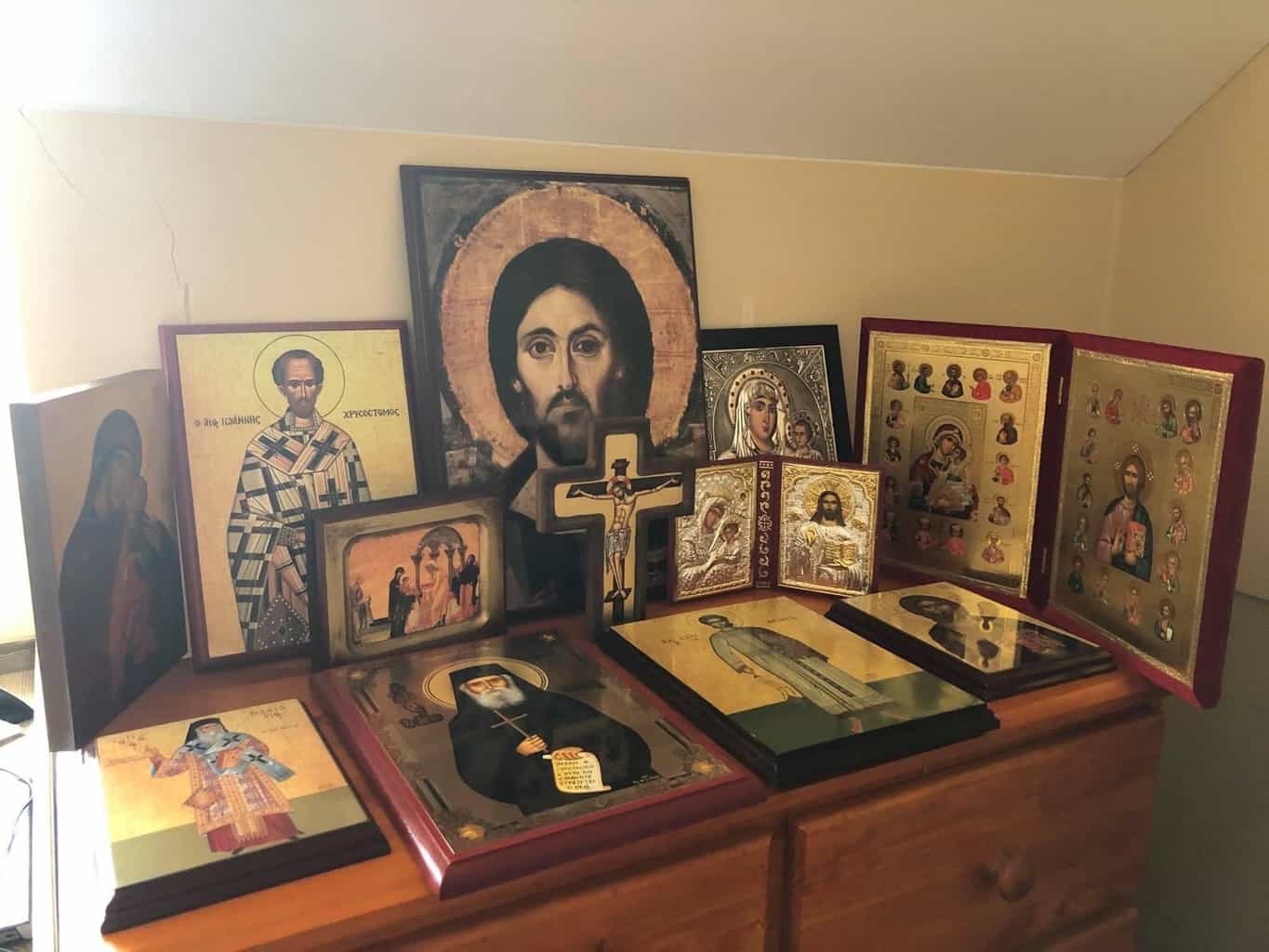
How was the Orthodox church (and faith) different for you?
It is my ever-renewing experience to see a Christian church which is so rich in iconography that derives my veneration:
to hear a church which is so purely commended through chanting that points directly into my soul (rather than rock music like in some Pentecostal churches);
to smell a church which is so fragrant with the omnipresent incense that leads to my prayers; to prostrate and touch a church which is so solemnly preparing for the Holy Communion, the presence of the Groom;
and to look forward to tasting a church which embodies the flesh and blood of Christ – not merely token bread and wine that may or may not consubstantiate.
What part of the Greek culture did you find appealing?
Some aspects of Greek culture that I found surprisingly similar to Chinese culture:
- Vasilopita can contain coin: whoever gets it has good luck and extra blessing for the rest of the year. Chinese lunar new year dumplings may contain lucky coins too
- Traditional family values: youths from both cultures may respect their elders and live communal life with extended families more than people from Western European backgrounds
- Greek culture is a very ancient civilisation, like the Chinese civilisation. Both have experienced histories of city-states (Greece: no later than 8th century BC – 338BC; China: 770-221BC); iconoclasm of some forms (Greece: 726-842AD; China: 446-452, 574-578, 842-846, 955-959); major barbarian conquests, to name just a few
- A contrast: The openness of greeting one another. Chinese people never hug each other. That indicates the will and intention particularly of the Greeks to treat each other kindly.
Let’s talk about your experience as a violinist. What made you start preforming and where are you performing now?
I believe in a life of self-challenge, and to perform classical violin music on stage is one of such challenges.
I started learning the violin as a child about 24 years ago, joined my high school orchestra and continued to perform as a solo violinist since coming to Australia.
I always supposed that Greek music was western music, but I’m wrong. It sounds unique, rhythmic, complicated at times, and emotionally colourful.
I have performed for the Greek Orthodox community on many occasions, including the 60th anniversary of Sydney Greek Orthodox Sunday Schools at the Sydney Town Hall in November 2015, Greek Independence Day celebration at the Parliament of NSW in March 2016, as well as a few performances for H.E. Archbishop Makarios of Australia since December 2019.
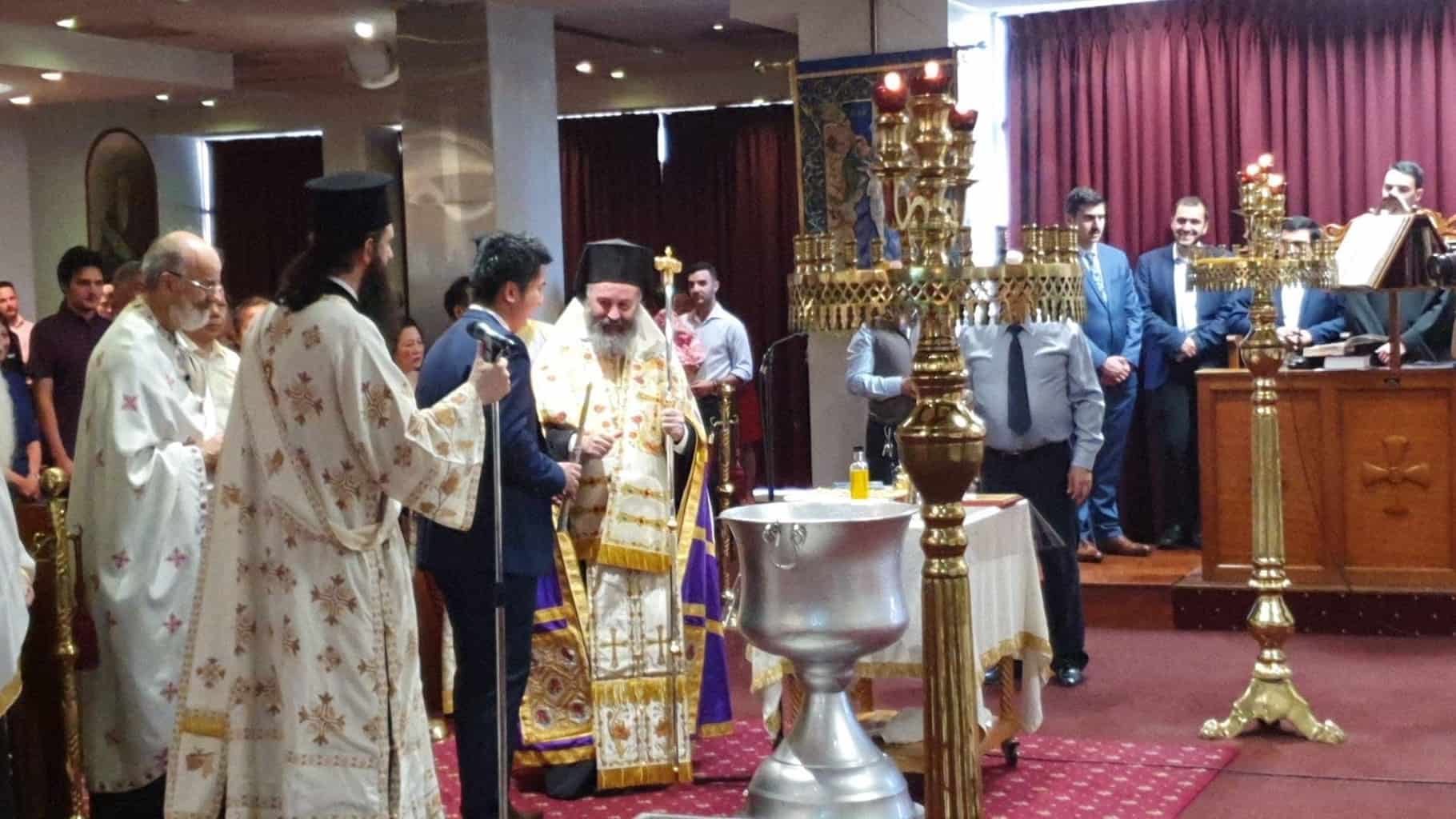
Lastly, how are you feeling about your new life as an orthodox Christian?
It is as if I am about to set sail, not in Noah’s Ark, but a tiny yet comfortable boat almost in the shape of an 11th century brick-layered Orthodox church building, for a very long journey.
The boat has just disembarked from dry land into the uncharted waters, seeking the Heavenly Light.
Though the sun may scorch me by day, and the moon by night and tempests can swamp my boat at any hour, I shall always have Christ as my refuge, who rebukes the winds charismatically: ‘Quiet! Be still!’ (St. Mark 4:35-41).
Yianni’s Chrismation into the Orthodox Faith was at the St. Ioannis Greek parish in Parammatta on Saturday.
May he be eternally blessed and we wish him health and prosperity.
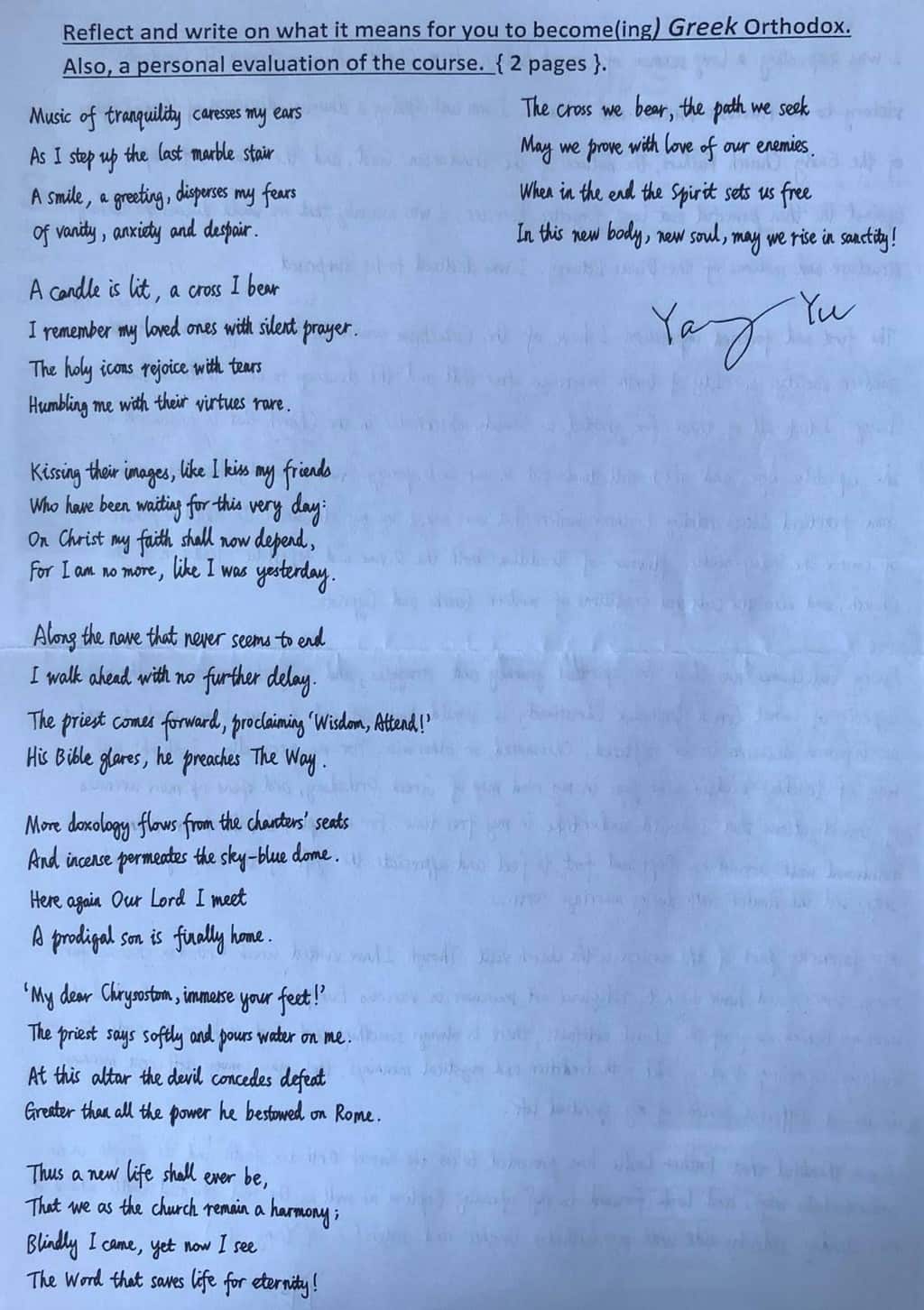
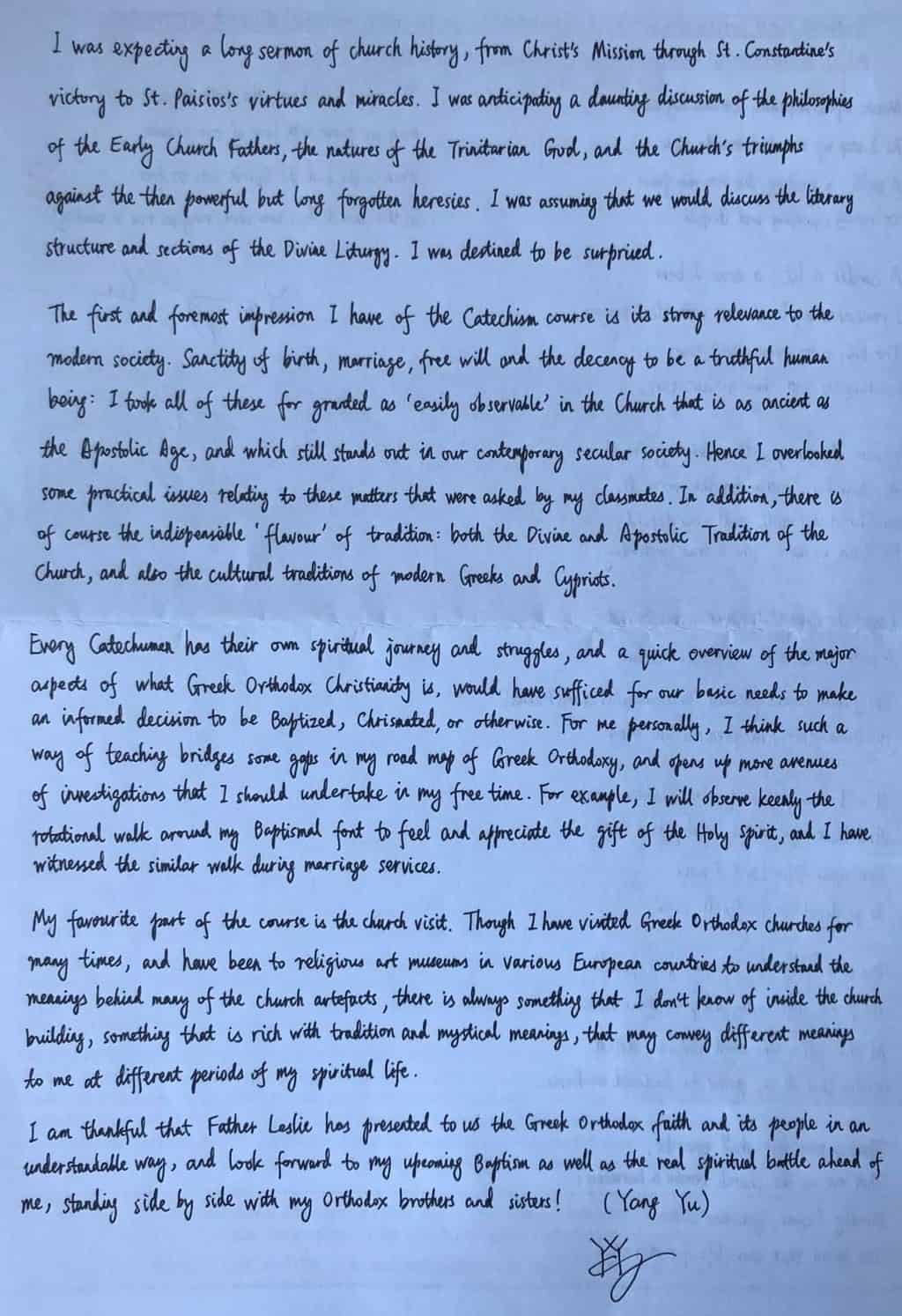
Read Yianni’s Blogs in-depth here:
https://www.bloggingshakespeare.com/speaking-the-shakespeare
‘An imagined Orthodox Divine Liturgy in Ravenna in the year 547AD’
https://www.bloggingshakespeare.com/the-banker-of-florence
Read also on Greek City Times:
“Orthodoxy Changed my Life.” Meet Elyssa – El Savadorian Catholic turned Greek Orthodox

